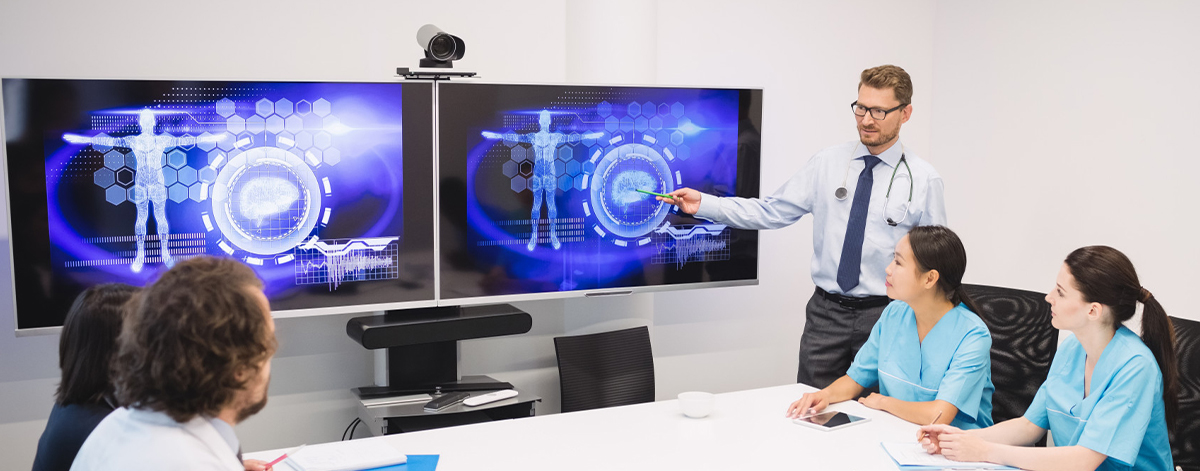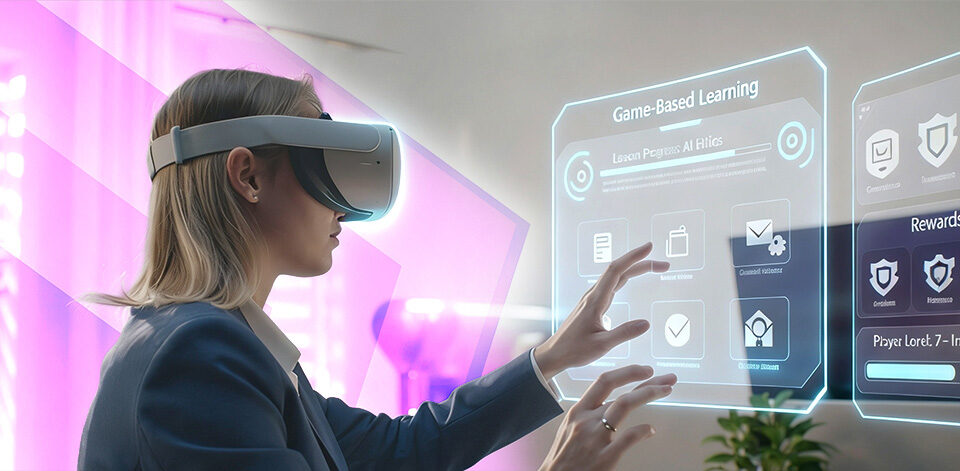
Sales Enablement Training: Equipping Teams for Success
October 31, 2025
Corporate Compliance Training: Ensuring a Culture of Accountability
October 31, 2025Table of contents
Healthcare education is evolving rapidly. Medical professionals must continuously learn, unlearn, and relearn to keep pace with new technologies, treatment protocols, and regulatory standards. Regular training models, often confined to classrooms or lengthy workshops, can’t match the speed and scale of modern healthcare demands.
Yet healthcare eLearning solutions, when aligned with a healthcare LMS, are bridging this gap by providing flexible, personalized, and data-driven learning experiences. These solutions combine instructional design expertise with digital innovation to support continuous skill development, patient safety, and compliance across the healthcare ecosystem.
How Healthcare eLearning Services Empower Medical Education
The integration of eLearning services in healthcare has transformed how medical knowledge is delivered and applied. Instead of one-time sessions, healthcare professionals now access on-demand, interactive, and scenario-based learning modules that mirror real-world challenges.
Here’s how eLearning solutions empower medical education:
- Scalable Training Across Geographies: eLearning enables consistent medical training for professionals across hospitals, universities, and research institutions regardless of location or time zone.
- Realistic Simulations and Virtual Labs: Using video-based simulations and 3D visualization, learners can safely practice surgical techniques, diagnostic procedures, and patient interactions before entering real clinical settings.
- Continuous Learning and Assessment: Integration with a healthcare LMS allows educators to track progress, assess competencies, and personalize learning paths based on learner performance.
- Compliance and Certification: Automated compliance modules help institutions stay aligned with industry standards such as HIPAA, OSHA, and patient data privacy regulations.
By merging evidence-based instructional strategies with digital interactivity, healthcare eLearning solutions enhance retention, improve learner engagement, and accelerate professional readiness.
Key Components of Healthcare eLearning Solutions
Successful healthcare eLearning programs are built on structured, learner-centric design. Below are the key components that make such solutions effective and impactful:
- Custom Learning Content
Tailored eLearning modules align with institutional goals and specific medical disciplines. Content includes videos, microlearning units, infographics, and gamified case studies designed to simplify complex medical concepts. - Interactive Simulations and Scenarios
Interactive learning environments replicate real-life healthcare settings—helping learners apply theoretical knowledge to clinical decision-making. This approach builds confidence and critical thinking skills. - Assessment and Feedback Systems
Regular formative and summative assessments evaluate knowledge retention and skill proficiency. Feedback mechanisms within healthcare LMS platforms help track learner progress and identify areas for improvement. - Compliance and Regulatory Modules
eLearning for health often includes mandatory training on patient safety, ethical practices, and regulatory requirements, ensuring consistent adherence to legal and medical standards. - Data and Learning Analytics
Integrated analytics dashboards (through LMS or LXP systems) allow administrators to measure engagement levels, completion rates, and overall training effectiveness. These insights guide future training strategies. - Mobile and Microlearning Support
Short, focused modules enable healthcare professionals to learn on the go—making it easier to fit learning into busy schedules without compromising patient care.
Together, these elements ensure that healthcare training remains relevant, compliant, and aligned with the evolving needs of the medical community.
Medical Fields Where Healthcare eLearning Solutions Can Be Implemented
Healthcare eLearning solutions are versatile and can be applied across multiple disciplines to strengthen knowledge, improve safety, and enhance patient care. They help healthcare institutions build a skilled, compliant, and confident workforce across various domains.
- Clinical Education and Nursing:
Healthcare eLearning modules can recreate high-stakes hospital environments to train nurses and clinicians in critical procedures such as patient assessment, wound care, and infection control. For instance, an immersive virtual simulation can place learners in a high-pressure emergency room scenario where they must stabilize a patient experiencing cardiac arrest — performing CPR, managing oxygen delivery, and using a defibrillator correctly under time constraints. Another module might simulate safe handling of medical equipment such as ventilators, IV pumps, or infusion devices, ensuring staff understand correct setup and troubleshooting to prevent life-threatening errors. These scenario-based experiences sharpen decision-making and build confidence in responding to real-world clinical emergencies. - Medical Research and Life Sciences:
Digital training ensures researchers and lab technicians stay updated on evolving methodologies and regulatory standards. For instance, an eLearning course on Good Clinical Practice (GCP) can guide professionals through proper documentation, trial management, and ethical research procedures, ensuring accuracy and compliance. - Pharmaceutical Training:
Healthcare eLearning programs are ideal for upskilling pharmaceutical sales and marketing teams on new product launches, dosage information, and pharmacovigilance protocols. For example, interactive role-play simulations allow sales representatives to practice explaining a new injectable medication to healthcare providers — addressing common physician questions, discussing side effects, and overcoming objections in a controlled, virtual environment.
Another module may include 3D animated dosage training, visually demonstrating each step of drug administration — from preparing the syringe and identifying the injection site to ensuring proper disposal — followed by embedded quizzes that test comprehension and reinforce safety procedures.
For compliance training, pharmacovigilance simulations can recreate real-world interactions where a rep must correctly identify and report an adverse drug reaction. Branching scenarios guide learners through decision-making paths, showing the outcomes of correct versus incorrect reporting. Each interaction is tracked within the system, ensuring completion, compliance, and readiness before field deployment. - Public Health and Community Medicine:
eLearning for health can strengthen community healthcare initiatives by training field workers on disease surveillance, outbreak response, and vaccination logistics. During pandemic preparedness training, for example, modules can demonstrate infection prevention strategies and proper use of PPE to minimize exposure. - Healthcare Administration:
Administrators and non-clinical staff can use eLearning courses to stay compliant with healthcare regulations and improve operational efficiency. For example, training on HIPAA compliance or patient data security helps staff safeguard sensitive health information and uphold patient trust. - Patient Education:
Hospitals and healthcare providers increasingly use eLearning tools to educate patients on self-care, medication adherence, and recovery plans. A short interactive video, for example, can guide patients through post-surgery physiotherapy exercises or explain how to manage diabetes effectively at home.
Future Trends in Healthcare eLearning Solutions
- Immersive VR and AR Clinical Simulations
Next-generation eLearning solutions use virtual and augmented reality to replicate real-world clinical environments. From practicing robotic surgeries to managing emergency triage scenarios, immersive
simulations enhance procedural accuracy, confidence, and decision-making — all within a risk-free digital space.
- AI-Driven Personalization and Predictive Learning
Healthcare eLearning systems with the help of AI can now recommend targeted micro-modules, automate recertification learning, and continuously update curricula to align with evolving medical standards and regulations. - Learning in the Flow of Care
Modern healthcare eLearning is moving toward point-of-care microlearning — short, interactive bursts of training embedded into daily workflows. Whether it’s a quick refresher on infection control or a just-in-time tutorial on a new medical device, these learning moments support continuous performance improvement without disrupting patient care. - Global and Remote Workforce Enablement
As telehealth expands, healthcare organizations are adopting cloud-based eLearning ecosystems to train remote, hybrid, and cross-border medical teams. This ensures consistent access to compliance updates, continuing medical education (CME), and procedural learning — no matter where care is delivered. - Data-Driven Competency and Performance Mapping
The next wave of healthcare eLearning solutions connects training analytics with competency tracking and clinical performance outcomes. By correlating learning data with patient care metrics, healthcare leaders gain actionable insights into workforce readiness, helping them strengthen both compliance and quality of care.
Partnering for Excellence in Medical Education
Medical training success hinges on expertly designed content, seamless workflow integration, and robust competency measurement. These solutions fulfill compliance and elevate the skills, readiness, and confidence of your workforce. So the challenge for L&D leaders is maintaining a current, compliant, and impactful digital training strategy.
Ozemio provides the expert eLearning services powering these transformations. We design, develop, and deploy the custom, scenario-based modules, immersive content, and performance-mapping solutions required for modern healthcare, ensuring your training investment directly improves patient outcomes.



